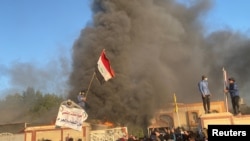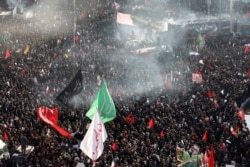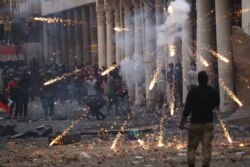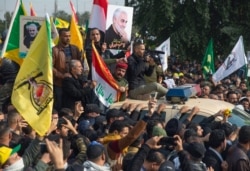The expulsion of U.S. troops from Iraq, which Iran has long wanted and the Iraqi Parliament is now demanding, may rebound on Tehran, say some analysts, especially if the Iranians seek to amplify the political turmoil in Iraq with the aim of pushing U.S. forces out of that country this year.
"The danger is a return to civil war," according to Niall Ferguson, an analyst at the Hoover Institution, a U.S.-based research group.
Amid heightened sectarian tensions, a Sunni-Shi'ite conflict is one of the possible outcomes of the killing of top Iranian general Qassem Soleimani in a U.S. drone strike. Soleimani was Iran's master fixer in the Middle East and commander of the country's elite Quds Force, the unconventional warfare and military intelligence wing of Iran's Islamic Revolutionary Guard Corps.
For Iran, a civil war breaking out in neighboring Iraq, a country Tehran has been determined to turn into a "vassal state," would be a nightmare scenario, raising the risk of Iran being drawn into a quagmire, straining its already sanctions-straitened resources as it faces an escalating and unpredictable conflict with the United States.
"Iranian leaders see control over Iraq as essential to their political survival, an 'economic lung' to alleviate the crush of (U.S.) sanctions, and a crucial overland logistical supply link to the Syrian regime and Lebanese Hezbollah," said Emma Sky, a Yale University academic and former political adviser to U.S. forces in Iraq.
Iran is the most influential external actor in Iraq after years of nurturing deep ties to Iraqi politicians and Shi'ite militias grouped together and known as the Popular Mobilization Forces, or PMF. Arab Shi'ites outnumber Arab Sunnis by 15 million to 8 million, although Sunnis, if the Kurds are included, total 17 million. In recent weeks, Iran's influence on Iraq has been challenged by an anti-Iranian, pro-reform nationalist surge.
Protests in Iraq
Since October, mainly Sunni protests against the Shi'ite-controlled government have mounted. The protesters, mainly young people, have been demanding an overhaul of the post-2003 political system that has institutionalized sectarianism. They also want the prosecution of corrupt politicians and an end to Iran's perceived domination of Iraq.
Protests have spread from Baghdad to other cities in southern Iraq. Nearly 500 people have died in the protests, with nearly 30,000 injured, according to rights groups. In December, protesters torched the Iranian consulate in the Shi'ite holy city of Najaf and desecrated the shrine of late Ayatollah Mohammed Baqir al-Hakim, a pro-Tehran cleric who was assassinated in 2003 after he returned to Iraq following two decades of exile in Iran.
Iran's proxy militias have violently targeted the protesters, escalating the campaign against pro-reform activists and organizers in Baghdad and across southern Iraq in a bid to stamp out the dissent and channel political action in Tehran's favor. In December, Iraqi newspapers reported that the militias were identifying protesters using security cameras and trawling government databases. Hundreds of protesters reportedly are still missing following kidnappings in Baghdad alone.
The violence involving the pro-Iranian militias against the protests has gone hand in hand with PMF attacks on U.S.-led coalition forces and Western contractors, as well as the targeting of influential Shi'ite cleric Muqtada al-Sadr, who, while opposing the U.S. presence, has criticized Iran's influence on Iraq and aligned himself with Sunni protesters. Analysts and Western officials say the militia violence has been directed by Tehran, and until his killing last week, masterminded by Soleimani.
The Iraqi government has appeared powerless — or unwilling — to stop the Iranian-directed militias and its own security forces venting their fury on protesters expressing frustration with corruption, poor public services, unemployment and Iranian interference.
"Heightened instability may prompt the government to take even harsher measures to shut down the protests, which they regard as an existential threat," according to Sky in a commentary this week for Foreign Affairs magazine. She notes the pro-reform protests amount to "the largest grassroots mobilization since the ouster of Saddam Hussein." The former Iraqi strongman was executed in 2009 following his conviction for crimes against humanity.
Sectarian divisions
How the Iranian militias react in the coming days remains unclear. Some analysts believe Tehran may order the militias to exercise restraint, given Iran's flagging reputation in Iraq and fear of further U.S. action. Others say with sectarian anger at a fever pitch, Tehran may have little control over events as they play out and that the Islamic State terror group, which many think is poised for a resurgence, could exploit heightened tensions.
Iraq's sectarian divisions were on sharp display in Baghdad in the hours after Soleimani's death, with thousands of Shi'ites mourning his demise on one bank of the Tigris River and flooding the streets to accompany the slain general's coffin.
On the other side, some anti-Iran protesters camped out in Baghdad's Tahrir Square told reporters they welcomed his slaying. Others, though, said they were tired of all and any foreign presence and interference in Iraq — American or Iranian — adding they fear how Iran will react.
Olivier Guitta, managing director of GlobalStrat, a London-based risk consultancy that advises governments and private companies, says one possible result of the drone strike on Soleimani might be an increase in Iraqi nationalist sentiment. He said "an anti-foreigner front" may emerge, one able to bridge the sectarian rift.
"The big question mark in Iraq remains really the Islamic State's resurgence, and how much they could sway the Sunnis back into their camp versus the Shi'ites," Guitta said. He added, "I believe Iran is going to undergo a very difficult period in both Iraq and Lebanon, especially since they lost with Soleimani, their main strategist and the de facto foreign minister of Iraq."
U.S. President Donald Trump ordered the drone strike on Soleimani after a quickening series of tit-for-tat escalations between the U.S. and Iran amid the militia attacks on U.S. forces and bases.
U.S. Secretary of State Mike Pompeo said Trump did so because intelligence gathered by U.S. agencies suggested Soleimani was planning large-scale actions in the region that "would have put dozens, if not hundreds, of American lives at risk."







